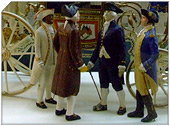Getting Started
Index
NYC Neighborhoods
Manhattan
Brooklyn
Queens
Bronx
Staten Island
NYC Icons
Chrysler Building
Flatiron Building
Empire State Building
Safe NYC
NYPD
FDNY
NYC Weather
NYC Climate
NYC Weather Forecast
Winter Season
Spring Season
Summer Season
Fall Season
NYC History & Politics
New York City History
Tammany Hall and Politics
New York City Politicians
New York City Personalities
Culture of Gotham City
Culture of the city
Cultural diversity
City in popular culture
|
Irving Grant Thalberg (May 30, 1899 - September 14, 1936) was an American film producer during the early years of motion pictures. He was called "The Boy Wonder" for his youth and his extraordinary ability to select the right scripts, choose the right actors, gather the best production staff, and make very profitable films.
Thalberg was born in Brooklyn, New York to German Jewish immigrant parents. He had a bad heart and was plagued with other ailments all his life. Upon completing high school, he was employed by Universal Pictures' New York office, where he worked as personal secretary to legendary studio founder Carl Laemmle, the boss of Universal Studios. Irving Thalberg was bright and persistent, and by age 21 was executive in charge of production at Universal City, the studio's California production site.
He quickly established his tenacity as he battled with Erich von Stroheim over the length of Foolish Wives (1922), and controlled every aspect of the production of The Hunchback of Notre Dame (1923). In 1924, he left Universal for Louis B. Mayer Productions, which shortly thereafter linked up with Metro Pictures Corporation to become Metro-Goldwyn-Mayer.
Thalberg is also famous for creating the "unit production management scheme", by which Hollywood productions are split more definitively into "units", thus spreading out the creative control of a film among producers, directors, etc.
The Big Parade (1925), directed by King Vidor, was Thalberg's first major triumph at MGM. Until 1932, when he suffered a major heart attack, he supervised every important studio production, and combined careful preproduction groundwork with prerelease sneak previews which measured audience response.
At the time he joined Metro Pictures, Thalberg was dating actress Norma Shearer whom he married in 1927. He wanted her to be a stay-at-home mother but she insisted she be given better roles and went on to be MGM's biggest star of the 1930s. They had two children, Irving Jr. (1930-1987) and Katherine (1935-2006).
Upon Thalberg's illness, Louis B. Mayer, who had come to resent Thalberg's power and success, replaced him with David O. Selznick and Walter Wanger. When he returned to work in 1933, it was as one of the studio's unit producers.
Nonetheless, he helped develop some of MGM's most prestigious ventures, including Grand Hotel (1932), Mutiny on the Bounty (1935), China Seas (1935), A Night at the Opera (1935) with the Marx Brothers, San Francisco (1936), and Romeo and Juliet (1936).
Thalberg died of pneumonia at age 37 in Santa Monica, California, during the preproduction of A Day at the Races (1937), and Marie Antoinette (1938).
His name appeared on the screen in only two pictures. The credit for his final film, The Good Earth (1937) reads: "To the Memory of Irving Grant Thalberg his last greatest achievement we dedicate this picture". Another dedication to him appeared in the opening credits of Goodbye, Mr. Chips (1939), a film that Thalberg set into motion, but never lived to see.
While alive, he refused to let his name appear in any of his films, and was quoted as saying, "Credit you give yourself is not worth having".
The new multi-million dollar Administration Building built on the old MGM Studios in Culver City (Now Sony Pictures Studios) was named after him two years after his death.
The Irving G. Thalberg Memorial Award, presented by the Academy of Motion Picture Arts and Sciences, is named for him.
F. Scott Fitzgerald based the character of Monroe Stahr in The Last Tycoon on Thalberg. In the film version (1976) he was played by Robert De Niro. Thalberg was also portrayed in the movie Man of a Thousand Faces by Robert Evans, who went on to become the producer of Chinatown and The Godfather.
Thalberg is buried in a private marble tomb in the Great Mausoleum at Forest Lawn Memorial Park in Glendale, California, lying at rest beside his wife Norma Shearer Arrouge (Thalberg's crypt was engraved, "My Sweetheart Forever" by Shearer).
|
New York City Search
Quick NYC
|



 New York Weather Forecast
New York Weather Forecast
 Ethnic composition
Ethnic composition


















